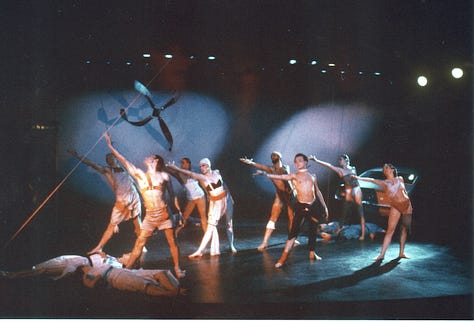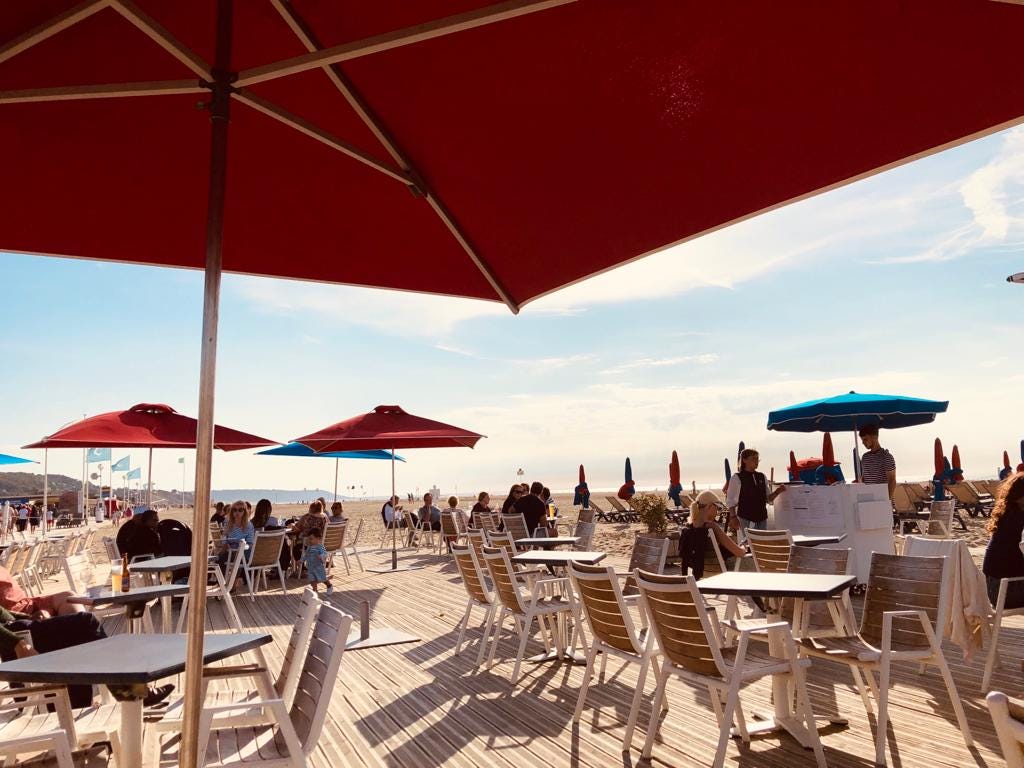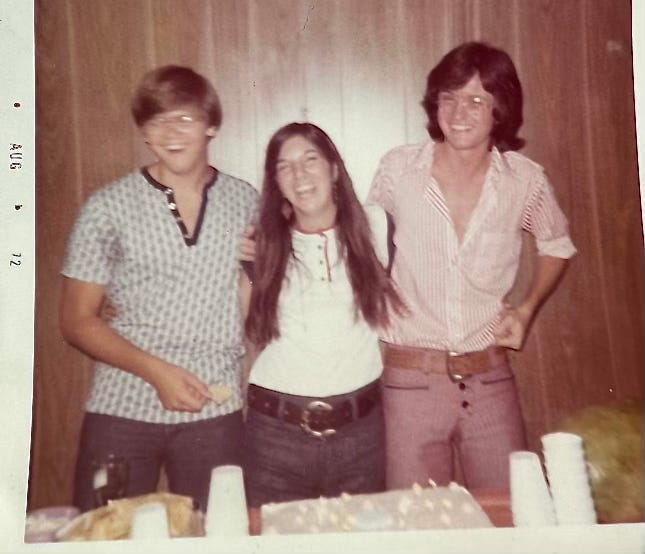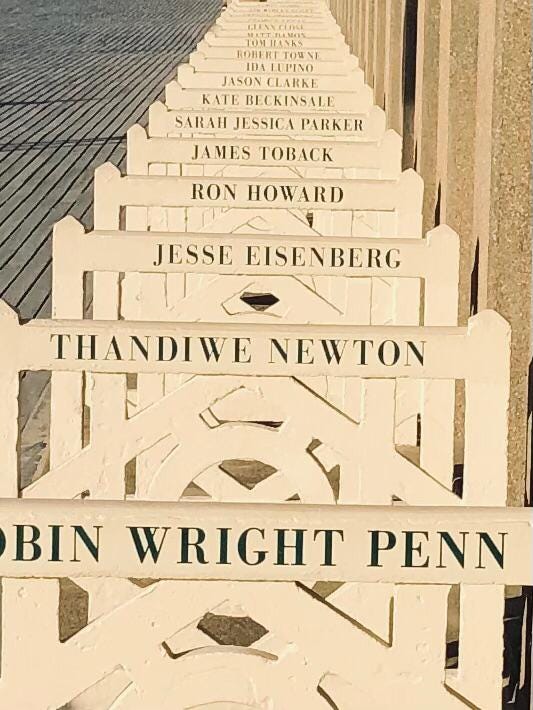I wasn’t going to write a September newsletter. I’m a bit overwhelmed right now trying to finish a paper for a Polish journal. The paper is about New World Performance Lab’s work over many years with songs from the Shaker tradition. I also have other writing commitments that I’ve been putting off and which need some attention. Plus, we have guests coming next week; we’re leaving for a short trip to Madrid in a few days; and it’s la rentrée, the season when everything begins in France—school, politics, performances, books—and strikes, of course. Everything has its rentrée. Sleepy August has ended and life in France roars itself awake. I scheduled several auditions with local choruses. Wish me luck. And, meanwhile, Kena and I have scrutinized the dance and theatre seasons to plan our cultural outings for the fall and winter. With all of this going on (I know, it still pales in comparison to what we were doing before retirement!), I thought it was maybe a good time to take a break from the newsletter for a month.
But something was nagging at me. Tonight I couldn’t sleep and I jumped out of bed and realized that I needed to start writing. I’ve been overcome by a wave of nostalgia recently. Maybe (again) it’s the time of year? When you’ve started a new school year every autumn for more than 50 years, it’s hard to break the habit, and something has been pulling at me, asking me to remember, to put some attention to the years that have passed, people forgotten, paths not taken.
My high school class celebrates its 50th reunion this month. 1973. “We’ll be free in ‘73.” That’s what we proposed for the class slogan. The administrators wouldn’t let us use it. Of course, I don’t remember what we actually did use as a slogan, but I recall the one we couldn’t use.
A committee of classmates has planned a full weekend of activities. I can’t go. Another trip to the USA this year would be impossible. I’ve never been to any of the class reunions (high school or college) and have never really felt a need or desire to attend, but this year I feel like I may be missing something. More than 75 members of the class have already died. Jairo and I figured it out and that’s about 18-20% of the class. I looked up the statistics and, actually, that’s within the average range for percentage of deaths of people born in 1955. Still, it seems like a lot of people from one class.
Anna, a friend from high school who was actually two years ahead of me (in my brother’s class), reached out through Facebook the other day and sent me some old photos from 1971-72. I look at that young, pit-stained guy holding a tortilla chip and I wonder what he could be thinking about the life he’s going to lead. Does he have any idea what he will experience—love, heartbreak, passion, fear, countless nights in rehearsal, grief, joy, the ecstasy of creation, the heaviness of responsibility, the depths of disappointment, pain, laughter, doubt, danger, pleasure…? Pleasure, the French word, plaisir—it is said to be one of the special qualities of their culture that allows the French to live longer. After all those hours in rehearsal, I’m now working on developing my plaisir.
September 1 is also the anniversary of my brother Bob’s death at the age of 19 in a motorcycle accident in St. Louis. I recall the night I received that phone call so well. It was 1984. I was in California and still living in summer housing, about to start my third year of graduate school. UC-Irvine was on the quarter system and classes didn’t start until late September or early October. I was at the top of the world, as the Carpenters sang in 1972. I had directed a well-received and provocative on-campus production of Shakespeare’s A Midsummer Night’s Dream and a not so successful version of King Lear at a summer festival in Redlands; I was working as Jerzy Grotowski’s assistant on his Focused Research Program in Objective Drama; I was going to be the first graduate student to direct a production on the mainstage at Irvine; and I was in the beginning of a relationship with a very smart, talented, beautiful woman named Lollie—a poet.






The Olympics were in Los Angeles that summer. I watched on television (from the sofa of my apartment where I lay sick from breathing the pollution of Redlands), as the American men’s gymnastics team battled the Chinese team for dominance. The delights of the Olympic Arts Festival, however, I enjoyed in person. That summer I saw: Tadashi Suzuki’s Trojan Women; Théatre du Soleil’s Richard II; Tadeusz Kantor’s Wielopole, Wielopole; Giorgio Strehler’s Tempest; Royal Shakespeare Company’s Cyrano with Derek Jacobi; and Pina Bausch’s Rites of Spring. It was a cultural feast and I was riding an aesthetic high. That phone call, the night of August 31 (it was early morning September 1 in St. Louis), knocked me for a loop.
There is really no recovery from that kind of shock, from the trauma and grief. There is only the will to move on. To keep going. Lollie and I stayed together for another year. It was a year full of extraordinary highs and lows. Then she went to Paris for some weeks and I house-sat Grotowski’s apartment above a breakfast place called The Big Egg in Long Beach. When she came back, we went to Tony Bennett’s concert in the park in the center of UC-Irvine’s campus. He sang “Once Upon Time,” and we held each other and wept.
This week, Lollie sent me two tender and lovely poems she wrote about our time together.
So here I am writing about nostalgia, plaisir, and the paths not taken and I receive Faustyna’s newsletter “Tablesetting.”
Faustyna, too, is feeling “le spleen de la rentrée” and writes about nostalgia and the “what-ifs,” the could-have-beens, as a friend of hers puts it, “the lives we didn’t get to live.” Faustyna traces her September feelings of nostalgia about food and New York City to a recently watched film, Past Lives.
I haven’t seen the film. It’s currently in competition at the Deauville Festival of American Film and will be released later this year in France, so it’s now on my list of must-sees. But I like very much how Faustyna ends her posting describing the film:
Past Lives is about nostalgia, but it’s more than that. It’s what if. It’s wondering what could have been, and choosing what is instead.
I love what is. And I love what’s ahead.
I first met Jairo at a dress rehearsal for the mainstage show I directed at UC-Irvine, Shaw’s Heartbreak House. He had recently arrived from Paris to join the staff of Grotowski’s research project. We have been life and work partners for almost 40 years.
It’s a good exercise to ask actors to imagine all of the different possibilities and scenarios leading to and stemming from one moment of decision in a play. If you choose such and such, instead of such and such, where will it lead you? The actor begins to see the importance and power of choice and action in relation to the waves of destiny and life’s happenings—shitty or otherwise. If Hamlet had chosen not to go away to university, could he have prevented his father’s murder? It’s interesting to muse about, but what’s more important is for the actor playing Hamlet to decide what to do about the murder now that it has already happened.
To do such an exercise in life, should lead you to understand that you are exactly where you should be. I know that’s where I am—where I should be, where I need to be. I wouldn’t want to be anywhere else.
My brother was a lighting design student at Webster University near St. Louis when his life was cut short. If you would like to make a contribution to his scholarship fund at Webster University to help a deserving design/tech student alleviate some of the cost of their studies, here is the link:
https://www.givecampus.com/campaigns/30521/donations/new?designation=robertgslowiakscholarshipfund&









Thank you, James, for another opportunity to recall fond memories, such as our work on Midsummer, and to feel some of what is in your heart. As always, sending love to you and Jairo.
It is healing to recall the lovely times as well as the sad memories. 75 students in your class?! That's a lot! My class was less than 30. In fact, UK classes can only be up to 30.